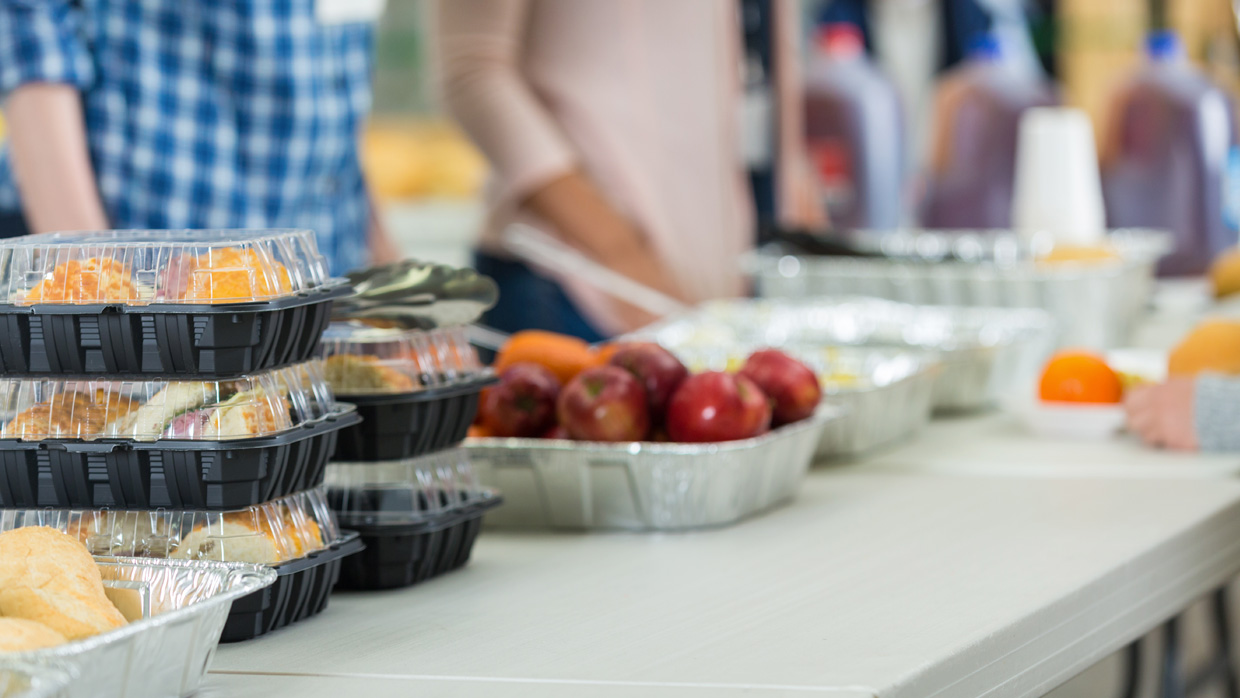Don’t Toss That Food! Learn to Recover and Donate Instead

No business wants to throw away perfectly good food.
Tossing out uneaten, overstocked or overproduced food wastes money, blimps our landfills and contributes to harmful carbon emissions. We also know uneaten food could serve a greater good – feeding hungry people in our communities. But donating unused food can feel challenging in regard to logistics and food safety.
Meet our Food Recovery and Donation Guide, created by Sodexo USA and the Sodexo Stop Hunger Foundation to help businesses and organizations repurpose their unused food. Originally written to support our own operators, we’re now offering this free guide to the public, so we can fight food insecurity together. Our goal: to help foodservice operators overcome obstacles and build successful food recovery programs.
The Problem
Every day, Americans throw away millions of pounds of food. In fact, up to 40% of all food in the U.S. is wasted, according to the U.S. Department of Agriculture. As that food decomposes in landfills, it emits significant levels of greenhouse gases. Rotting food is especially harmful because it releases high levels of methane gas, which is up to 34 times more potent than carbon dioxide and has a greater impact on climate change. Globally, food waste accounts for about 8% of all greenhouse gas emissions.
In America, we know:
- 34 million people are food insecure, including nine million children
- 100% of counties deal with food insecurity
- 53 million people sought help from food assistance programs in 2021
- 25 million Americans could be fed every year if we cut food waste 15%
One Solution
Food recovery effectively fights both climate change and hunger. This process diverts food from landfills and directs it to organizations working to end hunger.
Businesses that serve or sell food account for 40% of food waste in the U.S., making them uniquely positioned to lead the food recovery movement. Unfortunately, figuring out how to get unused food to those in need can feel complex and daunting. Restaurants and other businesses may be aware of the problem and have a genuine desire to help but are unsure where to begin. They may also lack the necessary resources to develop food recovery processes, form relationships with community organizations and navigate issues related to safety and liability.
That’s where our guide can help.
Our team began by examining Sodexo sites already recovering and donating food. We learned what works well, what it takes to launch a program and how to scale efforts to continually improve results. We also explored options for working with a diverse array of food recovery partners – nonprofits with food distribution infrastructure. Finally, we tested processes and gathered feedback to understand potential issues and identify solutions.
The team compiled and analyzed their findings and used them to create the guide, detailing how to establish a food recovery hierarchy and maintain a food recovery program. It walks foodservice operators through selecting a community partner to facilitate donations and provides links to multiple potential non-profit partners. It also addresses logistical considerations: which foods can be donated, applicable laws, labeling requirements, transport processes and food safety tips.
Communication is essential when developing or enhancing a food recovery program. The guide includes resources to facilitate communication at all levels – from senior leaders to partners. It even provides talking points for managers to engage onsite teams and help them understand the impact of their efforts.
Our Commitment
We hope other organizations – no matter the size or type – will benefit from the lessons we’ve learned and our resources. The aim is to enable any restaurant or business to quickly begin recovering food and donating it to those in need.
Sodexo is committed to ending hunger and reducing carbon emissions, and sharing best practices on food recovery supports our mission. We’re continually looking for ways to reduce food waste and cut carbon emissions at all of our sites – from universities to hospitals, office buildings to stadiums.
Jeremy Walls, Miami Dolphins, Hard Rock Stadium & Formula 1 Crypto Senior Vice President and Chief Revenue Officer, says:
"Our commitment to sustainability has been and will remain a priority for both us and our partners here at Hard Rock Stadium. Sodexo Live! both shares and drives this initiative with its commitments to food recovery post all events. Giving back to the community and driving sustainability clearly demonstrate adherence to responsible food service."
As we strive to lead in food waste reduction and food recovery, we will continue to share our learnings. Combating climate change and ending food insecurity are monumental goals and achieving them will require us all to work together. We know small changes can make a big difference, and sharing knowledge is a significant way to expand our impact.
The references throughout this guide are from a point in time and please be aware that regulations and innovations will continue to evolve. The guide is for informational purposes only and is not intended to provide legal advice.